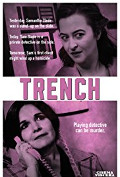
Directed by
Paul Anthony Nelson
90 minutes
Rated M
Reviewed by
Bernard Hemingway

Trench
What impresses most about Trench, the debut feature for Melbourne-based director Paul Anthony Nelson, is the integrity of its antinomian aesthetic. A heady blend of ideas, at once stylish and gauche, defined by its genre antecedents yet refreshingly original, it walks a tightrope between the farcical and the banal, wobbling dangerously at times yet always managing to catch itself before falling..
The story follows a cash-strapped, struggling-and-losing stand-up comedian, Sam Slade (Samantha Hill ), who pretends to be a private detective and offers her services to a reclusive writer, Becky Holt (Perri Cummings), who is being stalked… in her own apartment.
Don’t worry too much about the story which lurches forward in large narrative chunks, wearing its film noir stylings much as Sam wears her borrowed trench coat and fedora, gussying up an over-wrought sensibility with a transparently ill-fitting disguise. The beauty of Trench is that this is intentional. Rather than being a spoof or a parody of a ‘40s noir thriller the film is like something that Jack Black and Mos Def might have come up with in Michel Gondry’s Be Kind, Rewind (2007) had they had more time and a slightly bigger budget.
The film’s masterstroke is not only in gender reversing the standard noir male protagonist (unfortunately Sam’s rival Philippa Marlowe only rates a verbal mention) and replacing him with a modern-day, latte drinking, North-of the-Yarra bohemienne but in casting Samantha Hill in the role. Having neither the looks nor the poise nor the silvery tones of a noir femme, fatale or otherwise, she makes for a delightfully different heroine. With only a dogged eagerness masking her creeping desperation Sam makes it up as she goes along, charming her way into the apartment of the boozy, sharp-tongued older author (well played by Ms Cummings who was also co-writer and co-producer) and bumbling her way through her first case more by good luck than good management.
The two Sams hold the film together, its episodic script veering from the mordantly funny (Sam in a little black dress trying to entrap a chauvinist suspect) to the ill-advisedly crude (she interviews a potty-mouthed self-styled chauvinist pig who happens to be a fellow stand-up), updates the noir thriller for the internet generation, and throws in references to Jane Austen,Virginia Woolf, Dorothy Parker and post-feminist feminism for good measure. It get perhaps a little too dark, then silly, towards the end but it’s not a major problem as the film has built up a sizeable store of good-will by then.
Although the sound at times is intrusively hollow, the technical chops on display are essential to the film’s success. The high contrast black and white cinematography, which tends to suggest American independent film of the 1950s more than 1940s Hollywood is a real asset as is the art direction by Kimberly Potts (who also was responsible for something called “wardrobe design” but was probably a couple of trips to the op shop), the two working together to make credible despite their evidently limited budget ($28,000 in total) the film’s hermetic retro-modernity . That Mr Nelson was cinematographer and editor (he also co-write and co-produced) was no doubt an important factor in achieving such a coherent effect. One final credit here should go to Melbourne jazz muso, Adam Rudegeair, whose super-hip original score is a real treat from go to whoa.
As we all know it’s hard enough to get any film up. When a self-produced, small-budgeted one manages to get such impressive results it’s well worth supporting.
Want something different?





